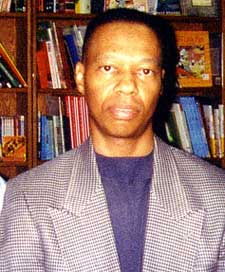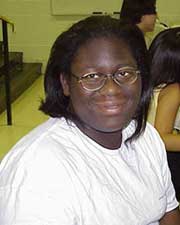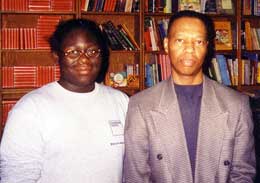Major Works
Books
- Reading the Earth: Poems
- Joy in the Morning (to be published)
- Marvelous Light (to be published)
Paintings
- “Between Me and Thee”
Claude Wilkinson: A Biography
by Ethel Brooks (SHS)
Claude Wilkinson was born in Memphis, Tennessee, and grew up on a farm in northwest Mississippi. He is the youngest of four. He has three older sisters: Bernadette Wilkinson, Juliette McGaha, and Ernelle Taylor. His first poem was in 1981. He is a graduate of the universities of Mississippi and Memphis respectively. Over the years his poems have appeared in numerous journals and anthologies, including Atlanta Review, The Oxford American and The Southern Review. His collection, Reading the Earth, won the Naomi Long Madgett Poetry Award.
In 1999, Wilkinson was awarded a Walter E. Dakin Fellowship in Poetry from the Sewanee Writers’ Conference; and in 2000, he won the Whiting Writer’s Award which included a $35,000 check. (What’s UP) He has also published criticism on the work of Chinua Achebe, Italo Calvino and John Cheever.
Also a visual artist, Wilkinson’s drawings and paintings have been included in exhibitions at Greater Memphis Arts Council, Meridian Museum of Art and Tupelo Artist Guild Gallery, among many other invitational, juried and solo shows.
In 1993, he won the W. M. Whittington, Jr. Purchase Award. He won first prize in the Carnegie Center for Art and History’s exhibition in 1994 and was recommended by the African American Museum to the House of Seagram in New York City for its Emerging Artist Commission in 1995.
He has been selected for inclusion in Who’s Who in the South and Southwest,Who’s Who in America and Who’s Who in the World. In addition to private collections, his work is also in the permanent collections of Cottonlandia Museum and Deposit Guaranty National Bank. Although his family didn’t support him in his choice of careers, they have since understood and now support him in his works. (Wilkinson)
According to Adian Aumen, who wrote an article called “Grisham endowment brings to teach,” Wilkinson is working on a new collection of poems and several critical essays that will soon be published into a book. Wilkinson has taught at various colleges and universities in the English Departments, so teaching is no stranger to him. (Grisham Endowment and Wilkinson) According to Billy Watkins, columnist for What’s UP newspaper, Wilkinson was the first poet to serve as writer in residence at Ole Miss. (What’s UP)
Reviews
A Review of Reading the Earth
by Ethel Brooks (SHS)
When I saw the title of the book, I wondered about it. I thought about how a person would read about the earth with poems. Then after I read the first couple of poems and was able to know a little about Mr. Wilkinson, I could see some of the things that he talked about and what he felt about many things that has happened in his life. I remembered that he told me his parents died, but he didn’t tell me how. After reading “Knell”, I figured out what happened to his mother. There is a poem he wrote that tells you about one of his sister’s wedding. As I read the poem, I could see the wedding and how it made him feel. I was able to get into the poems and make it seem as if I was there to see it all.
Claude Wilkinson’s Reading the Earth is a book of poems that deals with the way of the world and deals with his life personally. Wilkinson’s poem “Knell” tells about him dealing with his mother’s illness and death. From just talking to Mr. Wilkinson about his life and his work, it seems that if you get to know the author for who he really is, you will find a piece of his life in every poem.When you want to reflect on your life, read a couple of his poems that tell you about him, and you will find a piece of yourself in those poems, too. When reading the “Knell” poem, I learned how it feels to sit and watch your parent change from a grown person to a child in just days. I also experienced this with my father, but he didn’t die. Wilkinson’s poems reveal that God makes things the way they are. I think this book would be good for every person big or little, great or small. This book has poems that deal with life and how one person has dealt with different situations during their lifetime. It gives you a sense of what you as an individual can do in the same situation.
Wilkinson’s poems are so blunt and spiritual because if you allow yourself to let his words overcome you, you will see things you never wondered about that happen in the world. Things happen around us all the time, and we seem not to take the initiative to open our eyes to the real things in life instead of what we want to see. Wilkinson makes a person see many things that happen in a person’s life.
Interview with Claude Wilkinson, 2001
by Ethel Brooks
1. Do you have any siblings?
Yes. I have three older sisters. Their names are Bernadette Wilkinson, Juliette McGaha, and Ernelle Taylor. I’m the youngest and the only boy.
2. Where did you attend high school?
I attended Southaven High School.
3. Who was your role model as you grew up?
I didn’t have a role model so to speak, but my mom was inspirational to me as I grew up.
4. Who inspired you to write poetry?
No one inspired me because I just felt like poetry was an easy way for me to speak my mind.
5. How many books have you written?
The next book will be the second published.
6. How many poems have you written?
I have written many poems. I would say hundreds of poems.
7. When did you become interested in writing?
I started writing when I was ten, but I started writing seriously after college.
8. How many awards have you received since your book been published?
I have fifteen or more honor awards for “Reading the Earth.”
9. How has living in Mississippi influenced your writing?
It has influenced me a great deal, coming from a rural area in Mississippi.
10. Do you have any advice for student writers today?
My advice to student writers is to read more than you write. Not only read what you want to write about, but expand your reading so you may understand writing and what it brings out in you.
11. What do you think about your poetry, when someone tells you that it has changed his or her life in some way or other?
If it’s positive, I really enjoy it. Once a young lady told me that her sick father keeps my book next to his bed and that really touched me.
12. How does your family feel about your writing career?
At first, they questioned me about it; then later on my sister started supporting me. I don’t know about my parents because they’re dead.
13. What other things do you like to do in your spare time?
I don’t really have spare time because I have another career, painting. I try to split my year by writing one half, the next half I paint.
14. Tell me about your paintings. Who inspired you to paint?
I started drawing when I was four. I got serious about it later in high school. Edward Harper, George Innes, Claude Monet are just a few people I most admire.
15. Which do you enjoy most writing or painting?
There isn’t one. They are two different things. My concentration is more focused when it comes to writing. Painting is more subconscious.
Related Websites
- Paintings on view at Southside gallery (Square books)
- The Enduring Night, poem by Claude Wilkinson
- Joy in the Morning excerpts
Bibliography
- Wilkinson, Claude. “Works on Paer.” [Online] Availablehttp://olemiss.edu/depts/u_museum/wilkinson.html. April 13, 2001.
- Aumen, Adian. “Grisham Endowment.” [Online]
- Availablehttp://www.olemiss.edu/depts/liberal_arts/news/grisham_endowment.htm. April 18, 2001.
- Wilkinson, Claude. Reading the Earth. East Lansing: Michigan State UP, 1998.
- Photo courtesy of Nancy Jacobs. April 26, 2001.
- Photo courtesy of Alvin H. Brooks, Jr. April 27, 2001.
- Interviewed Claude Wilkinson April 27, 2001 at Off Square Bookstore, Oxford, Mississippi.
- Watkins, Bill. “Writing win a surprise to poet from Miss.” The Clarion-Ledger. E1.
- Photo courtesy of National Poetry Month. [Online] Available http://squarebooks.com/dearreader/2001_03/08.html.



